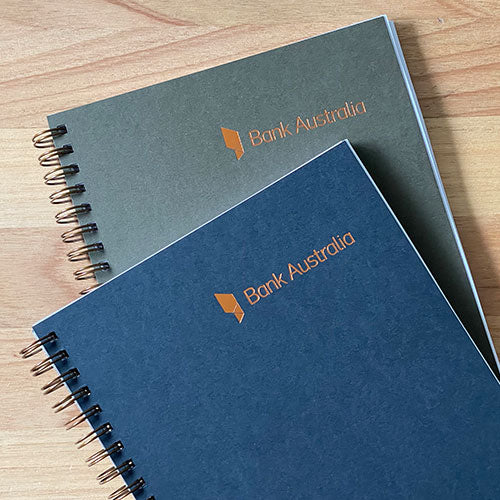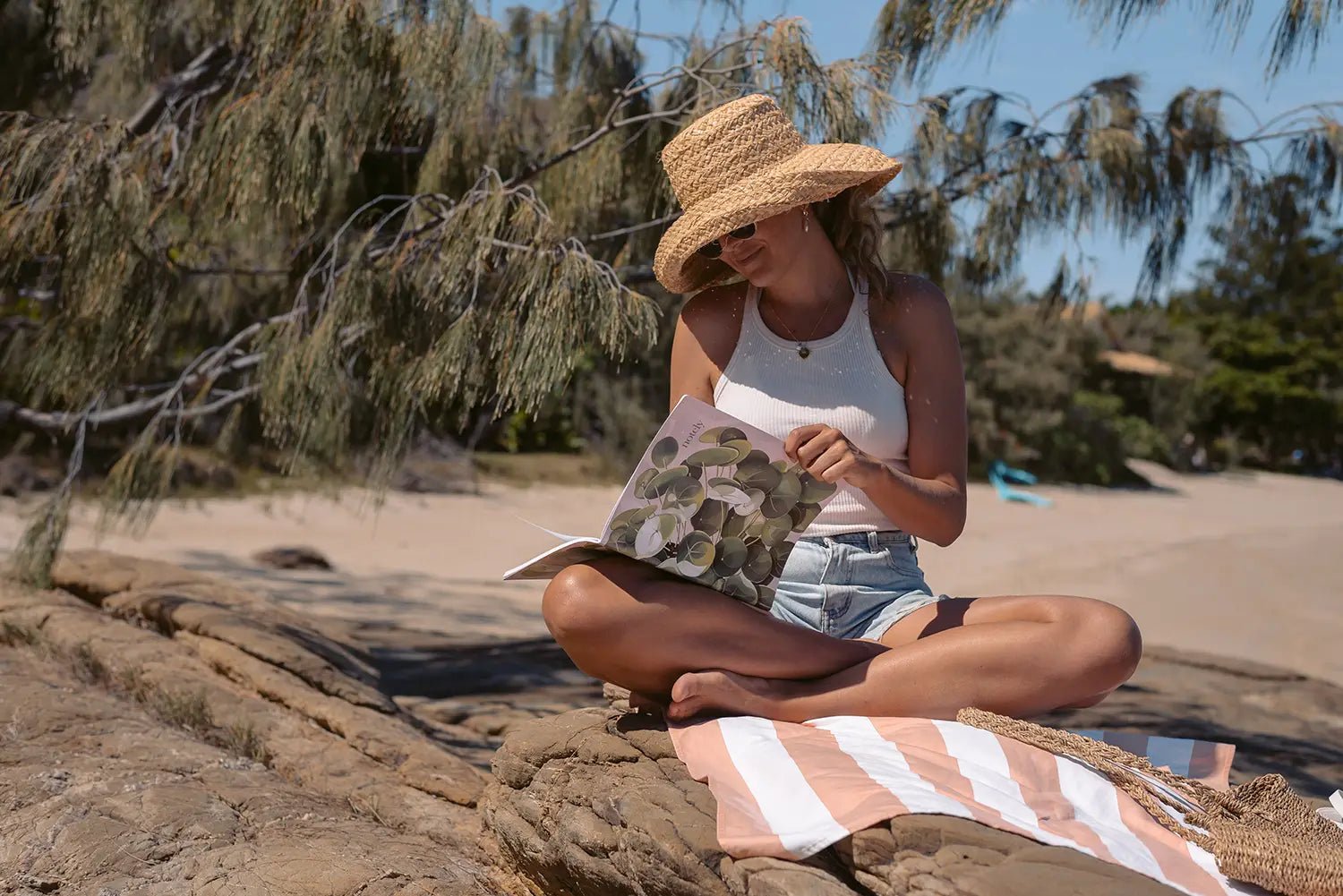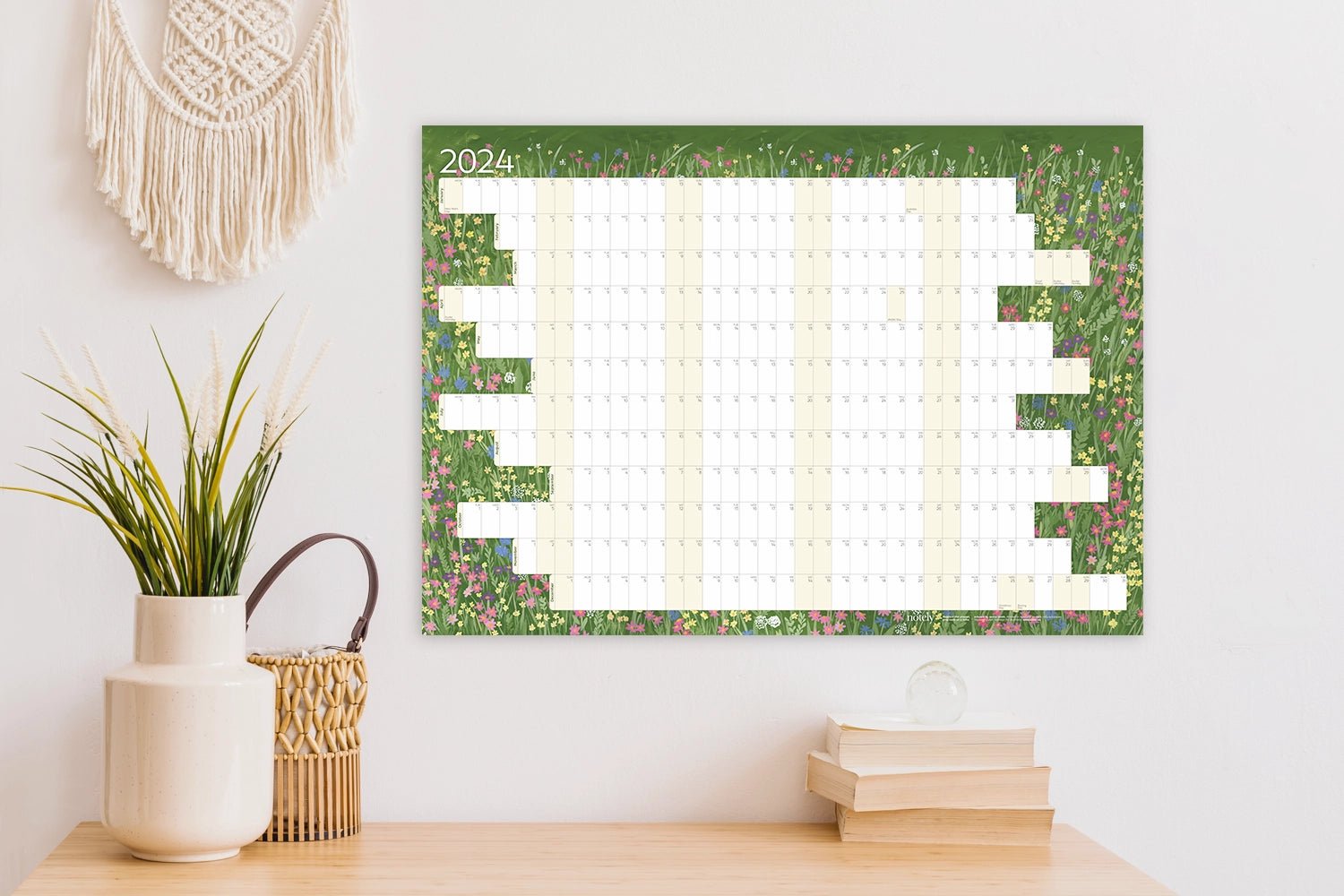Have you heard of nature journaling? It’s really a pretty simple practice – although the benefits are enormous, and it’s loads of fun.
All you need is a quiet spot (preferably outdoors, but it could be anywhere really as long as there is nature around you), a few minutes of quiet contemplation, and a notebook, sketchbook, or journal to record your observations.
Best of all… Nature journaling is not just for people with mad drawing skills and/or green fingers. It’s for everyone!
As an artist and environmental educator, Bethan Burton says in her blog post, 'Let's NOT make art’, “For those who feel nervous about putting pen to paper, I explain that nature journaling is not about creating works of art, and this is why anyone can do it.”
The idea behind nature journaling is not to accurately draw plants, animals, or insects, but rather to create a connection with the natural world. You do this by observing nature and recording what you see, hear, smell, feel, or experience in a way that’s meaningful to you.
The recording part can take any form you feel comfortable with, whether it’s drawing, painting, pressing plants, writing notes or poetry – even composing music or songs. Or a combination of all these.
The ritual of journaling with nature
Nature journaling is more than just putting pen to paper; it's a meditative practice that encourages mindfulness and introspection. The act of stepping away from screens and immersing oneself in nature fosters a sense of presence and connection.
This type of journaling creates a bridge between the tangible beauty of the outdoors and the intangible realm of your thoughts and emotions. The rustling of leaves, the chirping of birds, and the gentle caress of a breeze provide a serene backdrop for this introspective journey.
When you make a regular practice of taking time out to reflect in and on nature, you’ll not only get a break from your fast-paced life, but you’ll also develop a deeper appreciation for and connection with the natural world. This deeper relationship fortifies the soul, energises the mind and body, and motivates us to live more mindfully.

The magic of analogue in a digital age
In a world dominated by smartphones and tablets, journaling with nature offers a respite from the constant barrage of notifications and alerts. The tactile sensation of putting pen to paper engages your senses in a way that typing on a keyboard cannot.
The slow, deliberate strokes of writing in your blossom journal or fern fancy notebook will encourage you to slow down your thoughts and embrace the therapeutic power of being fully present in the moment.
The physicality of journaling also provides a tangible keepsake of your experiences. Flipping through the pages of your plant journal or perfectly picked & minty leaf notebook evokes a sense of nostalgia and wonder, as you revisit moments of clarity, revelations, and emotional connections with the natural world.
The simple act of connecting with nature can be a powerful remedy for stress, anxiety, and burnout. When combined with the practice of journaling, this connection becomes even more transformative.
Nature journaling is a harmonious blend of mindfulness and creative expression, offering a myriad of benefits that enhance holistic well-being. Let's explore some remarkable advantages of this soul-enriching practice.
Benefits of nature journaling
1. A holistic approach to wellbeing
Numerous studies and reviews (such as Kuo M, 2015; Groenewegen et al., 2006, 2012; Sugiyama et al., 2008; de Vries et al., 2013; Hartig et al., 2014) have highlighted the positive impact that spending time in nature has on human physical, mental and emotional wellbeing.
Nature journaling takes this a step further by creating a synergistic relationship between the external environment and your internal thoughts. The practice has been shown to ‘mitigate feelings of burnout, anxiety and overwhelm, as well as promote a happier and healthier mental state’.
As you jot down your observations, sensations and musings while surrounded by nature's splendour, you create a sacred space for emotional processing and personal growth.
Daily journaling improves mental and physical health, and the act of translating the awe-inspiring natural world into words, fosters gratitude, mindfulness, psychological resilience and a renewed sense of purpose.
2. Stress relief & relaxation
Nature has a unique ability to soothe our senses and calm our minds. When you combine the tranquillity of a natural setting with the reflective act of journaling, you create a space for stress to melt away.
The serenity of nature and the rhythmic motion of writing, painting or drawing can lead to a profound sense of relaxation, allowing you to release tension and find inner peace.
3. Mindfulness & presence
Journaling with nature encourages you to be fully present in the moment. As you observe the world around you and record your thoughts in a lovely notebook or bullet journal, you naturally engage your senses and focus your awareness. This mindfulness practice not only deepens your connection with nature but also enhances your ability to be present in all aspects of your life.
In this way, nature journaling can form an invaluable component of your self-care regimen.
4. Enhanced creativity & reflection
The beauty of nature serves as a wellspring of inspiration for creative expression. Journaling in the midst of natural surroundings stimulates your imagination, inviting you to capture the essence of your environment through words, sketches, stickers, collages or even pressed flowers.
By capturing the visual elements of your surroundings, you cultivate a deeper appreciation for the beauty that surrounds you. This creative exploration nurtures your artistic side and opens the door to new ideas and perspectives.
5. Emotional processing & self-discovery
Nature's boundless beauty often mirrors the landscape of our emotions. By journaling with nature, you create a safe space to explore your feelings and thoughts.
The act of journaling prompts introspection and self-discovery. As you observe the world around you, you'll also gain insights into your own thoughts, emotions and aspirations.
By externalising your inner world in your botanical journal or Cup Notes notebook, you’ll gain insights into your emotions, triggers and patterns. This process of self-discovery promotes emotional intelligence and a deeper understanding of yourself and your place in the intricate web of life.
6. Fostering a deeper connection to the earth
A number of studies have shown that nature journaling fosters a strong connection to the earth, which can lead to a heightened sense of environmental awareness and a greater appreciation for the planet we call home.
By documenting your experiences in nature, you become attuned to the life cycles of the plants, animals, insects, or birds you’re observing, as well as to the cycles of the earth, the changing seasons, and the delicate balance of life.
7. Improved mental clarity
Translating your thoughts onto paper amidst the beauty of the outdoors, helps you to untangle mental knots and create space for fresh perspectives to emerge. The act of journaling helps declutter the mind, allowing you to organise your thoughts and gain mental clarity. When combined with the restorative power of nature, this effect becomes even more potent.
8. Boosted immune system
Spending time in nature has been linked to improved immune function. The stress-reducing effects of nature, combined with the positive impact of journaling on emotional wellbeing, can boost your immune system. A healthier body complements a healthier mind, leading to greater overall wellbeing.
9. Cultivation of gratitude
Gratitude is a natural by-product of journaling in nature. Crack open your gratitude journal as you immerse yourself in the natural world – whether by surrounding yourself with indoor plants, spending time in the garden with your pets or visiting your favourite beauty spots. Record the feelings, thoughts, sensations and positive vibes that come to you.
Through this practice, you will develop a sense of appreciation for the beauty that exists in the world. This will amplify your feelings of gratitude, helping you to focus on the positive aspects of your life and nurture a positive mindset.
10. Enhanced problem-solving skills
The act of observing nature's solutions to challenges – be it a plant adapting to its environment or a stream finding its way around obstacles – can stimulate your own creative problem-solving abilities.
By paying attention to and recording your observations of nature's harmonious patterns and intricate systems in your journal or notebook, you’ll be inspired to come up with new ways of thinking about problems you encounter and to deeply engage in reflective problem-solving.
11. Personal growth & resilience
Nature journaling is a journey of self-growth and resilience. By regularly engaging in this practice, you develop the capacity to adapt, evolve and overcome obstacles – much like the natural world itself. Your journal or notebook will become a testament to your progress – a record of your evolving thoughts and emotions as you navigate the various seasons of life.
12. A valuable tool for creative enquiry
Nature journaling can also be a tool for creative enquiry through which we can help ourselves and others see the beauty and wonder in the natural world. It enhances our understanding of the world around us and encourages us to enter a deeper level of enquiry about the natural world.
By helping us to identify and name plants and animals in the world around us, it prompts us to appreciate them more, which makes us want to find out more about them and discover the different roles they play in our environment.
A great example of nature journaling at work can be found in Hannah Jones, the founder of Wattle + Wonder. Hannah runs nature journaling workshops that help people to develop a deeper understanding and appreciation of Australian native plants.
Getting started with nature journaling
Eager to embark on your own nature journaling adventure? Here are some tips to help you get started.
Select your spot
Choosing the right spot is crucial for a fulfilling journaling experience. Whether it's a quiet park bench, a secluded forest glade, a rock beside the ocean, a peaceful lakeside retreat, or even your backyard, finding a place that resonates with you will enhance the connection between your thoughts and the natural environment. You can even go to a different place each time, as long as you find a place where you can comfortably sit and observe.
Can’t go outside? No worries…
You can do nature journaling in the comfort of your living room. Simply observe indoor plants, cut flowers, pets, fish, or books or photos of plants/animals/birds/fish/insects for inspiration.
One exciting way to do indoor nature journaling is to keep a plant journal. Take a look at our blog post ‘How to start and keep a plant journal’ for tips on how to do this. Also, have a listen to Hannah Jones chatting about her indoor nature journaling practice and workshops (about 31 minutes into the episode).
Gather your supplies
Be sure to use only environmentally friendly and sustainable stationery, such as Notely’s notebooks and journals. Our botanical-themed covers are especially inspiring for budding nature journalists. For instance, our fabulous 200-page botanical journalfeatures lush native vegetation on the cover in a watercolour design by children’s book illustrator Sophie Gilmore.
Once you’ve got your nature elements, your favourite notebook or journal, and your writing, drawing, painting implements, you’re ready to get cracking.
Set your intention for the session
Start by taking a moment to set an intention for your nature journaling session. Whether it's to find tranquillity, gain insights or simply appreciate the beauty around you, having a clear purpose at the outset will enhance your experience.
Observe & absorb
Spend time immersing yourself in your surroundings. Allow yourself to be fully present. Engage all your senses – listen to the sounds, feel the textures, smell the aromas, and pay attention to any feelings or sensations you may experience.
Capture the moment
Once you are fully engaged in the experience, start writing, sketching, or painting your observations, thoughts, and feelings. For instance, you can describe the landscape, record weather conditions, or reflect on the emotions evoked by your surroundings.
Need a little guidance or inspiration? Check out Bethany Barton’s Journaling with nature podcast for journaling tips, tricks, and prompts.
Embrace creativity
Don't be afraid to add visual elements to your journal. Remember, you are not there to create great art; you’re trying to capture a feeling, make a connection, and gather insights. As artist, naturalist, and nature journaling mentor John Muir Laws puts it, “[in nature journaling] we are drawing to learn, not learning to draw.”
Write poetry, sketch the flora and fauna, paint the changing sky, or paste in leaves and petals you collect during your outing – there’s no single ‘right’ way to do it. Everyone’s journal will look different. Just do what feels right for you and don’t be afraid to get a little bit out of your comfort zone and experiment with new techniques.
Reflect & revisit
After your journaling session, take time to reflect on your experiences. Over time, revisit past entries and notice any patterns or themes. This can provide valuable insights into your relationship with nature and yourself.
Some final thoughts on nature journaling
Life often pulls us away from our innate connection with the earth and journaling with nature serves as a poignant reminder of the beauty and serenity that surrounds us. This practice invites us to slow down, observe and reflect – fostering a deep sense of well-being that transcends the physical and reaches into the depths of our souls.
Journaling with nature offers a pathway to a more balanced and harmonious life – whether you're seeking stress relief, creative inspiration, or a deeper understanding of the natural world and your place in it
Grab a Notely journal and/or notebook & get started today
The best way to do nature journaling is to use an environmentally friendly and sustainable notebook, sketchbook, or journal. You’ll find a great range of these at Notely.
All our products use post-consumer and commercial waste, including FSC-certified recycled paper and card stock made from discarded coffee cups. Plus, by using Notely stationery, you’ll be helping us to reach our goal of replanting 100,000 trees by 2025. With one tree planted for every order, every 3 orders protect an extra 2m2 of native rainforest.

![Spearmint A6 Pocket Notebooks [BULK 8 PACK] - Notely Lined](http://notely.com.au/cdn/shop/products/spearmint-a6-pocket-notebooks-bulk-8-pack-notely-399099_1600x.jpg?v=1699275130)








